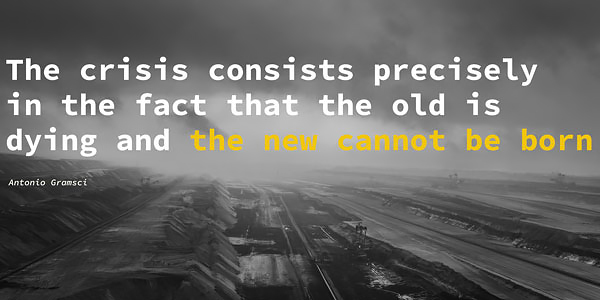By Lasse Thiele
The first part of this article offered an introduction to post-development thought, which for decades has been trying to deconstruct Western models of prosperity and growth. This second part introduces some of the countless linkages between critiques of development and contemporary European critiques of growth. The discourse on sufficiency for example - the idea of recognizing what is enough, which has been very popular with the degrowth movement (cf. Linz 2004, Schneidewind and Zahrnt 2013, Winterfeld 2007 and 2011) - is mirrored in the post-development literature despite differences in terminology (cf. e.g. Salleh 2009, Tévoédjrè 1979). Understood as a critical concept not restricted to moralistic appeals to individual consumer behavior, but also envisioning political and economic structures, sufficiency defines both a floor and a ceiling to appropriate material standards of living. By recognizing not only what is "too much" but also what is "too little," it contains an important claim to (global) social justice. Ascesis is considered just as undesirable as waste and excess. Such orientation towards a sufficient material standard of living leaves enough room for other aspects of human well-being. In addition to being widely recognized by the degrowth movement as an urgently needed corrective, it is also understood as an alternative to the capitalist logic of development within the anti-development literature.
The concept of the commons (cf. Helfrich and Bollier 2013), an even more popular buzzword, is a similar case. The orientation towards community-based production and self-organization "beyond market and state" is based on pre-capitalist and persistent non-capitalist forms of social organization, which globally have been either displaced by processes of capitalist modernization or are currently threatened by such displacement. These models are founded on understandings of human nature that are radically different from that of "homo economicus", which underlies market-based organization. The homo economicus model always assumes the individual as utility-maximizing, which is a narrow-minded caricature of humanity. "Commons"-based approaches combine economic needs with responsibility for ecosystems including humans, and with the human desire for community and communication. They require an enormous degree of local democracy and self-administration. The adoption of such a perspective in the context of thoroughly modernized, bureaucratic societies is a challenge that may be met more easily through engagement with post-development thought.
There are, however, problematic parallels as well. The more reactionary version of anti-growth writing (see e.g. Miegel 2010; critically addressing this: Bouvattier 2011) finds its equivalent in those post-development approaches that glorify "traditional" social structures without concern for gender roles or matters of individual identity. These approaches juxtapose such traditional models as a messianic promise of salvation to the evils of modernization (critically discussed by Ziai 2007). Such ideas make obvious just how important it is to critically engage even with proposals that attack the same enemy – if they do so from a very different angle. If a movement becomes associated with such positions, this will alienate potential allies within the progressive spectrum - who could be convinced by an intelligent and more self-reflexive critique of growth. Here, clear dissociation may be required.
A closer look at post-development writing reveals strong parallels to contemporary debates on growth in Europe. In the European context, however, many points of criticism leveled against Western lifestyles are often dismissed as "first-world problems" of saturated middle classes. This view disregards that quite similar sentiments have been voiced in regions where people's living environments have not yet been completely seized by capitalist modernization and which still find themselves in painful conflict with modernization processes. There, the differences between modern Western world views and alternative perspectives fall into much sharper relief.
Quickly one realizes that -- in contrast to the mantra commonly repeated in Western debates – the world is not exactly waiting to imitate Western lifestyles, even if their temptations certainly still exert a strong pull. In fact, the picture is revealed to be much more complex. The pervasive desire not to be condemned to material misery, in any case, should not be equated with the desire to live according to the Western growth model. The fulfillment of the former desire may in fact even require the deliberate rejection of the latter.
At any rate, the degrowth movement would be well advised to consider the needs of prosperous, burnout-threatened Europeans in the context of global developments. The same capitalist dynamics with their geographically very uneven impacts are at the root of hectic work routines in the West and the misery caused by land grabbing, privatization, extractivism and corruption in Africa or Latin America. This directly imposes conclusions critical of capitalism and social domination, and thus well-meaning consent to vaguely defined "growth" (or "development") in the global "South" - failing to do justice to these conclusions - clearly falls short. Instead, the challenge is to develop a qualitatively different understanding of prosperity and progress that all these perspectives can agree on – and which is connected to a willingness to engage in political conflict.
Many models of subsistence provisioning, some of them still in place today, together with their philosophical foundations provide an important source of inspiration in this context, particularly for people in Western (post-)industrial societies. To put it in heretical terms, this leads to a reversal of the conventional understanding of "development." Suddenly, it is the "developed" Western lifestyle which is considered obviously deficient - and alternative models from other regions of the world set the benchmark. These models, pointing far beyond the market, are not geared towards monetary economic growth.
The first signals of hope are on the horizon. Within the European degrowth movement, there is great interest in the Latin American buen vivir movements (Spanish for "good life" or "good living"; cf. Acosta 2011, Gudynas 2011), which explicitly position themselves in the tradition of anti-development thought. The obvious parallels between ideas of the "good life" on both sides of the Atlantic allow for an aha experience. Deepening these connections would certainly be a worthwhile endeavor.

New Roots for the Economy: academics, experts, artists, activists and organizations from around the world demand a farewell to our economy's growth dependency to avoid further crises. In the turmoil of the crisis, our everyday lives are being shaken up. We need to reinvent, adapt, organize ourselves. This is also true for the degrowth movement: this crisis has driven us to connect, debate, and...
Last month a group of academics working in the fields of development and environmental sciences in the Netherlands wrote a manifesto for post-corona recovery based on degrowth principles. This initiative gained widespread attention, pushing the degrowth agenda into (Dutch) mainstream consciousness and the traditional corridors of power. The initiative was born in conversations that various a...

While the limits and failures of our current economic and political system are known and repetitively pointed out by degrowth research, we have a deficit in the area of strategic planning for transformative politics. What is missing are entry points for politicizing and changing social values, norms and institutions. To do this successfully, it is useful to detect how hegemonic values are embed...